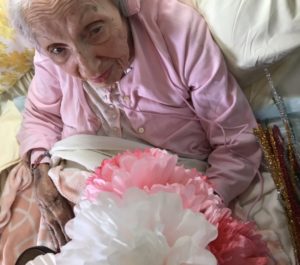When we told our daughter I had cancer, this happened.
Last month, when we told us just turned 10-year-old daughter with special needs that I had breast cancer, she cried. A lot. Used a whole box of tissues. Asked the most heartbreaking questions. Clung to her dad.
But then she jumped up off the couch, grabbed my heated neck wrap off the shelf, and proceeded to the kitchen, where she warmed it up for me. (Independently! A big deal for her!)

When she came back, she presented it to me with these words: “I want to help you feel better, Mom. I want to be your caregiver.”
My heart went from shattered to bursting.
What a gift at that moment, in the midst of a gut-wrenching conversation I wish no other parent, to see her take a brave step from her deep sadness to do something caring for me. I’ll treasure that moment always.
Mom, I want to be your caregiver.
– Michelle’s daughter
Was I terrified for the three weeks preceding that conversation? Convinced the news of my cancer would absolutely crush her and she’d never recover? Absolutely. In fact, most days, I was more fearful of having to tell her the news than of the cancer journey itself.
But as I reflect on the last 7 years of caring for our daughter—who joined our family through adoption when she was a toddler—emotional resiliency has been a prominent theme.
We’ve had to battle things as a family we never expected to.
We’ve had to provide a level of parenting we never imagined.
We’ve had to push through some excruciating days, not just by her bedside as she recovered from double hip surgery at the age of 5, but also on the kitchen floor where she’d throw herself in a severe meltdown because of school was over for the summer.
There were times I didn’t know if I could keep going. Our marriage was tested too.
And there are still days I’m not sure how I can keep going. There are still days when our marriage is tested by the complications of caring for a child with intense emotional and behavioral needs. Throw in cancer, and some days, it feels completely unbearable.
Then our village steps in Taking our daughter away for the weekend so my husband and I can breathe again. Taking her for two hours a week so I can take a nap. Bringing us meals so we don’t have the added pressure of preparing food. Cleaning the bathroom, picking up prescriptions, painting my toenails so I can feel pretty again.
Then the healthier coping skills we’ve all been forced to learn these last 7 years kick in: My daughter asks me for a hug. My husband says sorry for getting stressed out and yelling. I learn to ask for help.
Then, I can do it again.
I can rally after a hard chemo treatment to help my daughter with her homework.
I can reach out for encouragement from my special needs mama community to get an emotional boost.
I can keep caregiving with cancer. And I can model this tenacity to my daughter, who has shown it to me all these years too.
If you’re in the midst of a difficult family caregiving situation and unsure of how to break the news to the younger members of your family, know this: they can handle it. They want to help. They want to be included.
It will be hard, but there’s freedom in keeping things open, and a chance to draw closer together through the challenges.
Let your kids have the opportunity to care for you. Or for a grandparent, friend, relative, neighbor, or sibling. Let them find ways to shine in supporting someone who needs care. It’s a life lesson they’ll never forget.
Read our best blogs about caregiving, we consider our blog an engaging and helpful resource for family caregivers and those in need of assistance.

Comments
Post a Comment